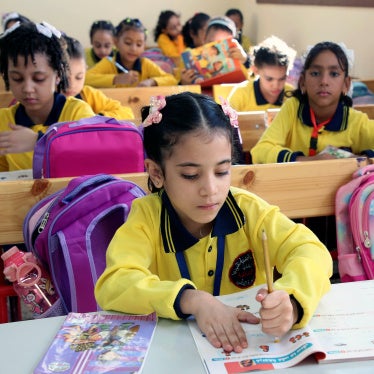Greater respect for human rights can make development more just, curb harmful practices and improve accountability.
Last month, Britain's shadow development secretary, Jim Murphy, promised to put human rights at the heart of Labour's approach to development. While many welcomed his statement, others have responded more negatively, expressing scepticism about the meaning and advantages of "doing development from a rights perspective". I believe the critics are mistaken.
At its simplest, the case for development that respects rights is that poor people seek not merely material improvements in their lives (higher incomes and better access to services) but also an end to abuse and discrimination. Development is best defined as creating conditions in which poor people can fully realise their rights – civil and political rights, as well as economic, social and cultural ones. In a similar vein, the Nobel prize-winning economist, Amartya Sen, defines development as freedom and the enlargement of people's substantive choices.
This is not mere semantics. The case for a broader definition of development is illustrated persuasively by Tunisia. Before the country's popular uprising in 2010, many saw the country as a development success story. Economic growth was close to 4%, 90% of children attended primary school, and life expectancy was 75 years. But for many Tunisians this was clearly not enough: higher incomes and better access to services did not compensate for the ills and costs of corruption, repression and inequality. Nor did it satisfy aspirations for greater justice, freedom and dignity. In January 2011, popular protests ousted President Zine al-Abidine Ben Ali after 23 years in power.
If the realisation of the full range of human rights is the goal of development, greater respect for specific rights can also be the means for achieving this outcome. Let me suggest three clear advantages of rooting development policy and practice in human rights.
First, it can help make development more just and inclusive. Despite real development progress for some countries over the past few decades, millions of people have been left behind, with little or no improvement in their lives. Often these people are drawn from marginalised and vulnerable social groups, including women, children, people with disabilities, ethnic minorities, indigenous peoples, and those infected with HIV.
These groups frequently lack the power, social or legal standing, or access to decision-making that allows them to challenge their disadvantaged status or improve their circumstances. Just last week, Human Rights Watch published a report on education in India, documenting the barriers and terrible discrimination experienced there by the children of Dalits, tribal groups and Muslims.
Rights-lite development will have little to say about these situations, because such poverty is rooted in the denial of human rights. By contrast, rights-respecting development requires action to tackle inequality, discrimination and exclusion, so that the poorest can access services on equal terms, as well as acquire land, property, assets and credit.
Second, respect for human rights can curb abusive practices associated with development. Incongruous though it may sound – especially to those who view development as a uniformly benign process – many people around the world are harmed by policies carried out in the name of economic modernisation and development. For example, in Ethiopia's Lower Omo Valley, Human Rights Watch has documented the government's policy of forced displacement of indigenous communities to make way for sugar plantations. Farms have been cleared, prime grazing land lost and livelihoods decimated – all in the name of economic and development progress. Abusive development of this kind occurs because basic human rights – to consultation, fair treatment, independent legal representation, and trade unions – are missing.
Third, rights-respecting development requires everyone involved in the development process – including wealthy countries, donors, international financial institutions and the private sector – to adhere to international rights standards and be more transparent and accountable about the impacts of their policies on the poor. A key reform would be for the UK government and others to make it mandatory for corporations to report publicly on human rights and the social and environmental impact of their work. Similarly, powerful institutions such as the World Bank should be required to adhere to human rights standards in all their work.
The rights and development sceptics are also critical of aid conditionality – the withdrawal or threatened withdrawal of aid in response to human rights abuses. Certainly aid conditionality can be a blunt instrument, and the poorest should not be punished twice for the failings of their government. But donors do have options about how they channel their aid, and they should use them. Human Rights Watch supported the UK government's 2012 decision to cut general budget support to the Rwandan government (and re-channel this assistance through NGOs and international organisations), given President Paul Kagame's backing for the M23 rebels in neighbouring Democratic Republic of the Congo. And when Uganda passed its draconian anti-homosexuality law in February, we argued not for a suspension of aid, but rather for pressure to curb rights abuses in the country – in particular, action to ensure that donor funds, especially in the health sector, were not complicit in abusive policies associated with the new legislation.
Despite the critics, there is a growing body of opinion that recognises the value of human rights to development processes and outcomes, with support for rights emerging as a high priority for civil society participants in recent consultations on the post-2015 development agenda. In countries and communities across the world, millions of people are striving to escape poverty, but also for an end to indignity and injustice, for their voices to be heard, and for the opportunity to shape their own futures. They deserve our backing.








